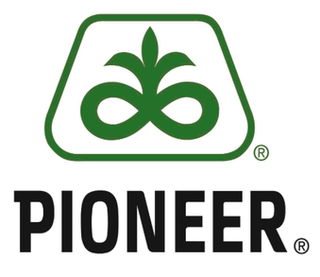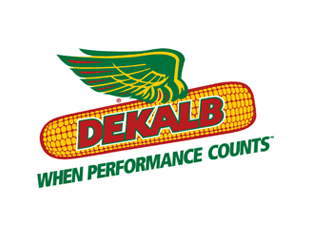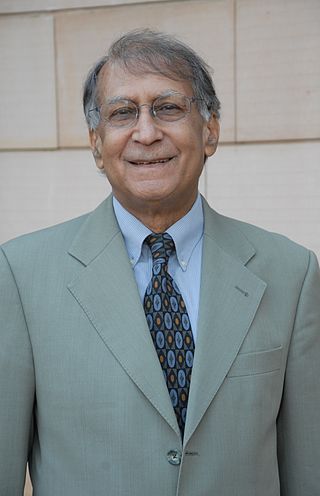Related Research Articles

Genetically modified maize (corn) is a genetically modified crop. Specific maize strains have been genetically engineered to express agriculturally-desirable traits, including resistance to pests and to herbicides. Maize strains with both traits are now in use in multiple countries. GM maize has also caused controversy with respect to possible health effects, impact on other insects and impact on other plants via gene flow. One strain, called Starlink, was approved only for animal feed in the US but was found in food, leading to a series of recalls starting in 2000.
The Monsanto Company was an American agrochemical and agricultural biotechnology corporation founded in 1901 and headquartered in Creve Coeur, Missouri. Monsanto's best known product is Roundup, a glyphosate-based herbicide, developed in the 1970s. Later, the company became a major producer of genetically engineered crops. In 2018, the company ranked 199th on the Fortune 500 of the largest United States corporations by revenue.

Syngenta AG is a provider of agricultural science and technology, in particular seeds and pesticides with its management headquarters in Basel, Switzerland. It is owned by ChemChina, a Chinese state-owned enterprise.

Pioneer Hi-Bred International, Inc. is a U.S.-based producer of seeds for agriculture. They are a major producer of genetically modified organisms (GMOs), including genetically modified crops with insect and herbicide resistance.
Devgen is a Belgium-based multinational agricultural biotechnology company. It uses biotechnology and molecular breeding technologies to develop varieties of food crops. Its technology is marketed by outlicensing or selling seeds in India and South-East Asia. Devgen also develops nematicides.
Since the advent of genetic engineering in the 1970s, concerns have been raised about the dangers of the technology. Laws, regulations, and treaties were created in the years following to contain genetically modified organisms and prevent their escape. Nevertheless, there are several examples of failure to keep GM crops separate from conventional ones.

Genetically modified food controversies are disputes over the use of foods and other goods derived from genetically modified crops instead of conventional crops, and other uses of genetic engineering in food production. The disputes involve consumers, farmers, biotechnology companies, governmental regulators, non-governmental organizations, and scientists. The key areas of controversy related to genetically modified food are whether such food should be labeled, the role of government regulators, the objectivity of scientific research and publication, the effect of genetically modified crops on health and the environment, the effect on pesticide resistance, the impact of such crops for farmers, and the role of the crops in feeding the world population. In addition, products derived from GMO organisms play a role in the production of ethanol fuels and pharmaceuticals.
Roundup Ready is the Monsanto trademark for its patented line of genetically modified crop seeds that are resistant to its glyphosate-based herbicide, Roundup.
Robert Tjian is a Hong Kong-born American biochemist best known for his work on eukaryotic transcription. He is currently Professor of Biochemistry and Molecular Biology at the University of California, Berkeley and an Investigator of the Howard Hughes Medical Institute (HHMI). On April 1, 2009, Tjian became the President of HHMI. On August 4, 2015, he announced that he would step down as President at the end of 2016.

Plant genetics is the study of genes, genetic variation, and heredity specifically in plants. It is generally considered a field of biology and botany, but intersects frequently with many other life sciences and is strongly linked with the study of information systems. Plant genetics is similar in many ways to animal genetics but differs in a few key areas.

DeKalb Genetics Corporation was a diversified company headquartered in DeKalb, Illinois that marketed agricultural seeds and other products. The company was best known for its leading role in the development of hybrid corn and for its "winged ear" logo. DeKalb Genetics Corporation was purchased by the Monsanto Company in 1998 and has been owned since 2017 by Bayer. The DeKalb seed business, the DEKALB brand and the winged ear logo are now owned and managed by Bayer.

Bayer AG is a German multinational pharmaceutical and biotechnology company and one of the largest pharmaceutical companies in the world. Headquartered in Leverkusen, Bayer's areas of business include pharmaceuticals; consumer healthcare products, agricultural chemicals, seeds and biotechnology products. The company is a component of the EURO STOXX 50 stock market index.

Asgrow is a seed company owned and operated by Bayer Crop Science.
Ceres, Inc. was a biotechnology company based in Thousand Oaks, California, United States that operated from 1996 to 2016, when it was acquired by Land O'Lakes. The company was a spinoff from UCLA researchers. Its ultimate commercial products were seeds of genetically modified crops used for biofuel production. In addition to its operations in the United States, Ceres had a subsidiary in Brazil called Ceres Sementes do Brasil.

Delta & Pine Land Company was initially chartered in Mississippi in 1886 as a land speculation company, but was inactive until 1919, when a British textile company acquired the name. In the 1920s and 1930s, the company operated one of the largest cotton plantations in the Mississippi Delta, with headquarters in Scott, Mississippi. In the latter half of the 20th century, the company divested its farm lands, concentrated on research and development of cotton and soybean seeds, and became world-renowned for its development of Deltapine cotton varieties.
Monsanto was involved in several high-profile lawsuits, as both plaintiff and defendant. It had been defendant in a number of lawsuits over health and environmental issues related to its products. Monsanto also made frequent use of the courts to defend its patents, particularly in the area of agricultural biotechnology.
Stine Seed Company is the world's largest private seed company, and the largest independent seed company in the US. It has more than 900 patents, specializing in soybean and corn genetics, is based in the small town of Adel, Iowa, and is almost entirely owned by Harry Stine and his four children.
J. E. M. Ag Supply, Inc. v. Pioneer Hi-Bred International, Inc., 534 U.S. 124 (2001), was a decision of the United States Supreme Court holding for the first time that utility patents may be issued for crops and other flowering plants under 35 U.S.C. § 101. The Supreme Court rejected the argument that the exclusive ways to protect these plants are under the Plant Variety Protection Act (PVPA), 7 U.S.C. § 2321, and the Plant Patent Act of 1930 (PPA), 35 U.S.C. §§ 161-164.
Maharashtra Hybrid Seeds Co. (Mahyco) is an agricultural company based in India. It is one of the country's major producers of seed. As of 2015, the company was also active in Vietnam, Indonesia, Philippines and Bangladesh, and planned expansion to Africa. The company produces seeds for cotton, wheat, rice, sorghum, pearl millet, maize oilseeds and vegetables crops. Through a joint venture with Monsanto named Mahyco Monsanto Biotech, Mahyco sublicenses Bt cotton technology in India. The Indian government has maintained price controls on Bt cotton seeds since at least 2011.

Surinder Mohan (Suri) Sehgal is an Indian-American philanthropist with a long career as a crop scientist, seedsman, entrepreneur, and leading expert in the global hybrid seed industry. His research and professional successes in the areas of plant breeding and genetics, agbiotechnology, intellectual property, business management, and seed industry development were carried out in executive capacities in several companies in the United States, Belgium, and Germany. After the divestment of a group of four seed companies that Sehgal founded and ran with his wife, Edda Sehgal, the couple created two nonprofit organizations to promote rural development in Suri's country of origin: Sehgal (Family) Foundation in 1998 in the US, and S M Sehgal Foundation in India. The foundations’ work focuses on water security, food security, and social justice with particular emphasis on women's empowerment. A proponent of corporate social responsibility and environmental sustainability, Sehgal has also provided support individually and through the foundations for projects related to agriculture research, the preservation of biodiversity and the conservation of natural resources.
References
- ↑ http://www.iowalum.com/daa/voelkelHolden.html, "Distinguished Alumni Award winner Ruby Voelkel Holden", University of Iowa Alumni Association, Accessed 2008-06-16.[ dead link ]
- ↑ Gilpin, Kenneth N. (1997-01-07). "Monsanto in a big seed deal whose price raises eyebrows". The New York Times. ISSN 0362-4331 . Retrieved 2023-01-31.
- ↑ , Iowa State University Office of Biotechnology. "Holden's Foundation Seeds Incorporates Genetically Engineered Traits Into Corn Lines", Biotechnology Update, October 1996, Accessed 2008-06-16.[ dead link ]